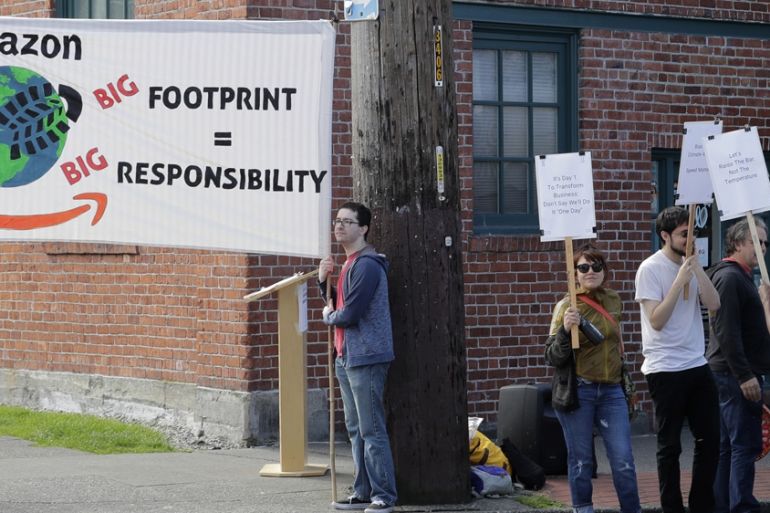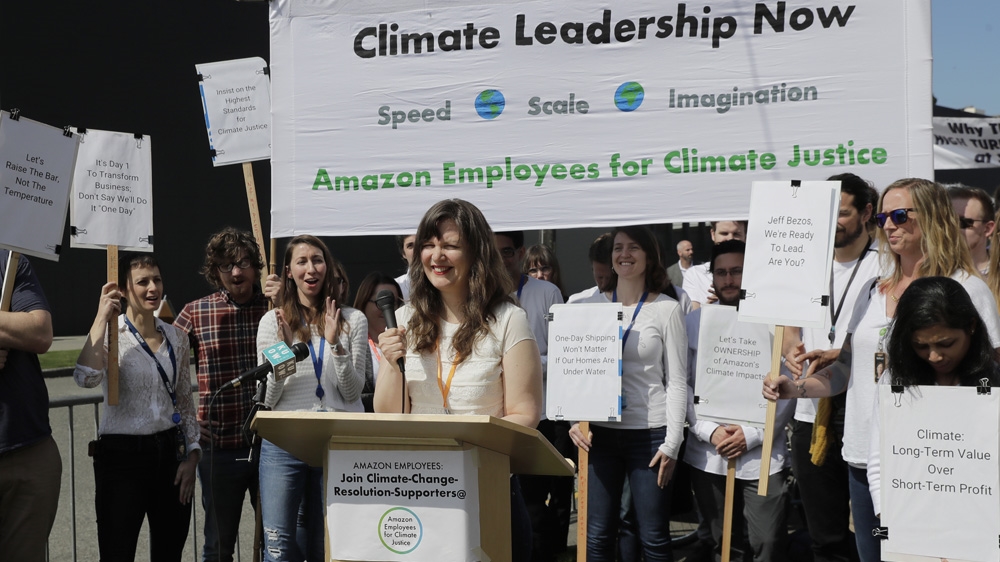Employee activists: Amazon ‘lagging behind’ on climate policy
As 7,900 workers call for carbon plan, tech titan promises – but has yet to deliver – info on greenhouse-gas emissions.

Nine of the 10 largest retailers in the world publish details of their emissions footprints through the Carbon Disclosure Project. All except for one.
And four of the five big-tech titans – Alphabet, Apple, Facebook and Microsoft – have announced ambitious plans to become fully carbon-neutral.
Keep reading
list of 4 itemsHow one Mexican beach town saved itself from ‘death by tourism’
Rio Mayor on hosting World Cup, Olympics together: ‘DON’T!’
COP28 Dubai is over: Four key highlights from the UN climate summit
But not Amazon.
Though the gargantuan company says it will reveal its carbon usage later this year, shareholders and employees eagerly await specifics on the firm’s true level of sustainability.
In the meantime, many investors and scientists wonder if the e-commerce and cloud-computing behemoth – which is based in Seattle in the United States – is glossing over questionable practices with misleading language.
Of the giant web-hosting companies, Amazon is “the least ‘green’ and the most opaque”, said Lotfi Belkhir, an associate professor of engineering at McMaster University.
Amazon’s biggest competitors have offset 100 percent of the power used by their data centres, he said, adding that the company “has negotiated secret deals with utility companies for heavily discounted electricity rates that further hide the full economic, environmental and social impacts”.
‘Shipment Zero’
At Amazon.com, Inc.’s shareholder meeting on May 22, over 7,700 activist employees – along with some sympathetic shareholders – failed to secure passage of a climate-change resolution. The proposal asks the firm to publish information on its carbon footprint and provide a timeline for cutting fossil-fuel use.
Proponents of the resolution said Amazon should publicly articulate a strategy for mitigating the impact of global warming on its operations, demanding a report “as soon as practicable”.
In February, Amazon released its Shipment Zero vision for making the delivery portion of its business net-zero with regards to carbon emissions, with the aim of at least 50 percent of shipments attaining that goal by 2030.
The company says it will release climate data by the end of 2019. Greenhouse-gas emissions figures could be staggering for huge data centres run by Amazon Web Services and for product shipments via long-haul cargo flights.
Amazon’s more than 50 cloud-computing centres – serving the CIA, Netflix, Verizon and many other large organisations – consume a massive amount of energy, each equivalent to that used by a small town. And emissions associated with package deliveries add around 20 million metric tonnes of carbon annually – equivalent to that produced by five coal-fired power plants.
All data centers in the US, including those run by Amazon and its competitors, consumed nearly two percent of all electricity generated in the country in 2014 – according to a report produced for the US Department of Energy.
For its part, the company says it has “over 200 scientists, engineers, and product designers dedicated exclusively to inventing new ways to leverage our scale for the good of customers and the planet”.
“We have a long-term commitment to powering our global infrastructure using 100-percent renewable energy,” said a statement from Amazon.
The company added that its innovative programmes include Frustration Free Packaging, Ship in Own Container, and a network of solar and wind farms.
‘Lead the path forward’
Rajit Iftikhar, a software engineer with Amazon Employees for Climate Justice, said the company’s emissions put the lives of the global poor at risk and that it is time for Amazon to do more to solve the climate crisis.
“We’re definitely lagging behind companies in the same field that have done more,” Iftikhar told Al Jazeera.
He said the group plans to refile the shareholder resolution next year, adding that those who voted against the measure last month are being shortsighted – about what is ultimately best for the company, as well as the environment.
“Investors tend not to go against what the board recommends,” he said. “People who voted ‘no’ are also not seeing the potential risks of being a company reliant on fossil fuels.”

Another employee activist, Rebecca Sheppard, took to the blogging site Medium in May to plead the case for the resolution to the top brass.
“Last year when I heard about this resolution, I realized that I didn’t need to make a tradeoff between my job and being on the right side of history,” Sheppard wrote.
“At Amazon, a place where we are called to innovate, disagree and commit, and have a bias for action, we can use our scale and ingenuity to lead the path forward with this Crisis,” she said.
“When I look at the nearly 8,000 signatures of my colleagues, I know that we are leading already and I am eager for [CEO] Jeff Bezos and senior leadership to join us.”
Employees such as Iftikhar and Sheppard argue that Amazon, which has a market capitalisation of almost $1 trillion, needs to have a climate plan in place and could even set a precedent for multiple industries – given that it encompasses technology, transportation, retail and media.
They also point out that the company’s delivery business is exposed to extreme weather events such as flooding, heatwaves and wildfires, which, they argue, bolsters the argument that the resolution is in the best interest of shareholders.
‘Climate emergency’
The shareholder climate proposal that was voted down cited multiple examples of how extreme weather has already disrupted Amazon’s operations.
The proposal noted that in March 2018, for example, “A data center supporting AWS suffered a power outage during Superstorm Riley, disrupting Amazon Alexa”. And in November 2018, “a tornado in Baltimore smashed an Amazon fulfillment center, ruined its merchandise, and killed two workers”. That same month, “California’s Camp Fire temporarily shuttered Amazon’s Sacramento fulfillment center, delaying deliveries”.
Beyond the direct impact that climate events can have on Amazon’s bottom line, the proposal also cited the potential for secondary lawsuits and reputation damage if the company is not seen to be doing more to mitigate emissions.
Glass Lewis and Institutional Shareholder Services (ISS), two of the largest proxy advisory firms in the US, had recommended voting for the resolution. In materials prepared for the May shareholder meeting, ISS wrote that Amazon “could be subject to significant risks with respect to both climate change and the regulatory implications or investor pressures that come as a result of climate change”.
Other materials prepared for the shareholder meeting included ratings provided by Sustainalytics, an independent corporate governance ratings provider that gave Amazon an “average” score for environmental, social and governance (ESG) risk. The data also labelled Amazon’s controversy level as “significant”.
Although Sustainalytics would not comment specifically on Amazon’s approach to climate issues, Roxana Dobre, a Sustainalytics ESG research manager, told Al Jazeera in a statement that “Amazon has made improvements to its policies and programs…to address ESG-related risks”.
Meanwhile, Amazon’s leaders argue that the hard work to contain climate damage has already begun, even though they officially opposed the resolution at the shareholder meeting.
With Amazon’s activist employees continuing to mobilise, the company’s share price is hovering below its all-time high from 2018. But because investors are generally demanding more accountability and sustainability, climate justice efforts could force the company’s hand.
Emily Cunningham, a Seattle-based user experience designer for Amazon, spoke up at the shareholder meeting in May to request that Bezos personally address climate issues.
“Companies not planning for rapidly transitioning off of fossil fuels are putting themselves at risk,” Cunningham told Al Jazeera. “The carbon-bubble pop is inevitable – and will be abrupt and disruptive.”
“[Arguing that] meaningful climate action is somehow ‘bad for business’, or harmful to shareholders, itself comes from the carbon lobby’s decades-long misinformation campaign,” she added. “We are in the middle of a climate emergency.”